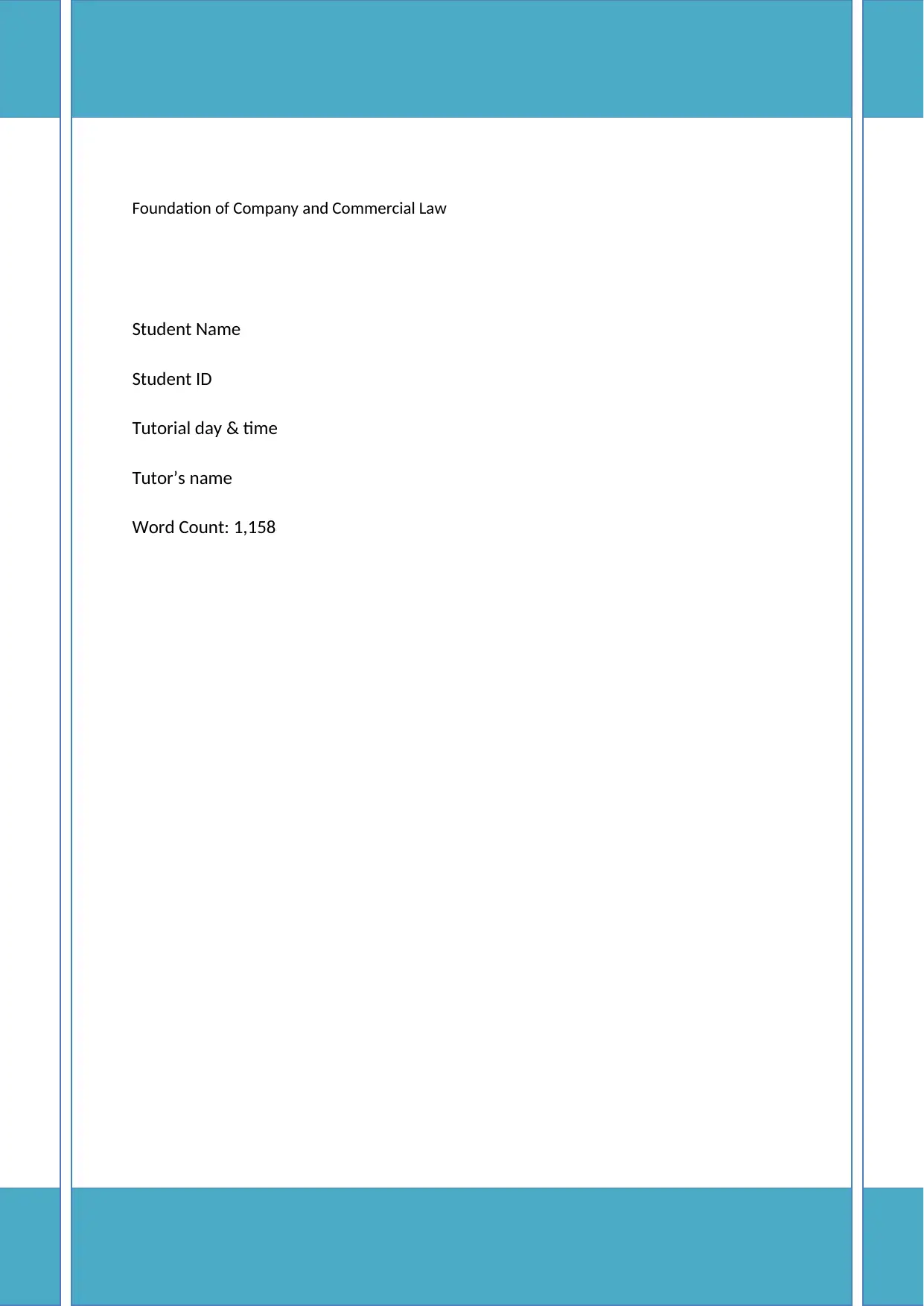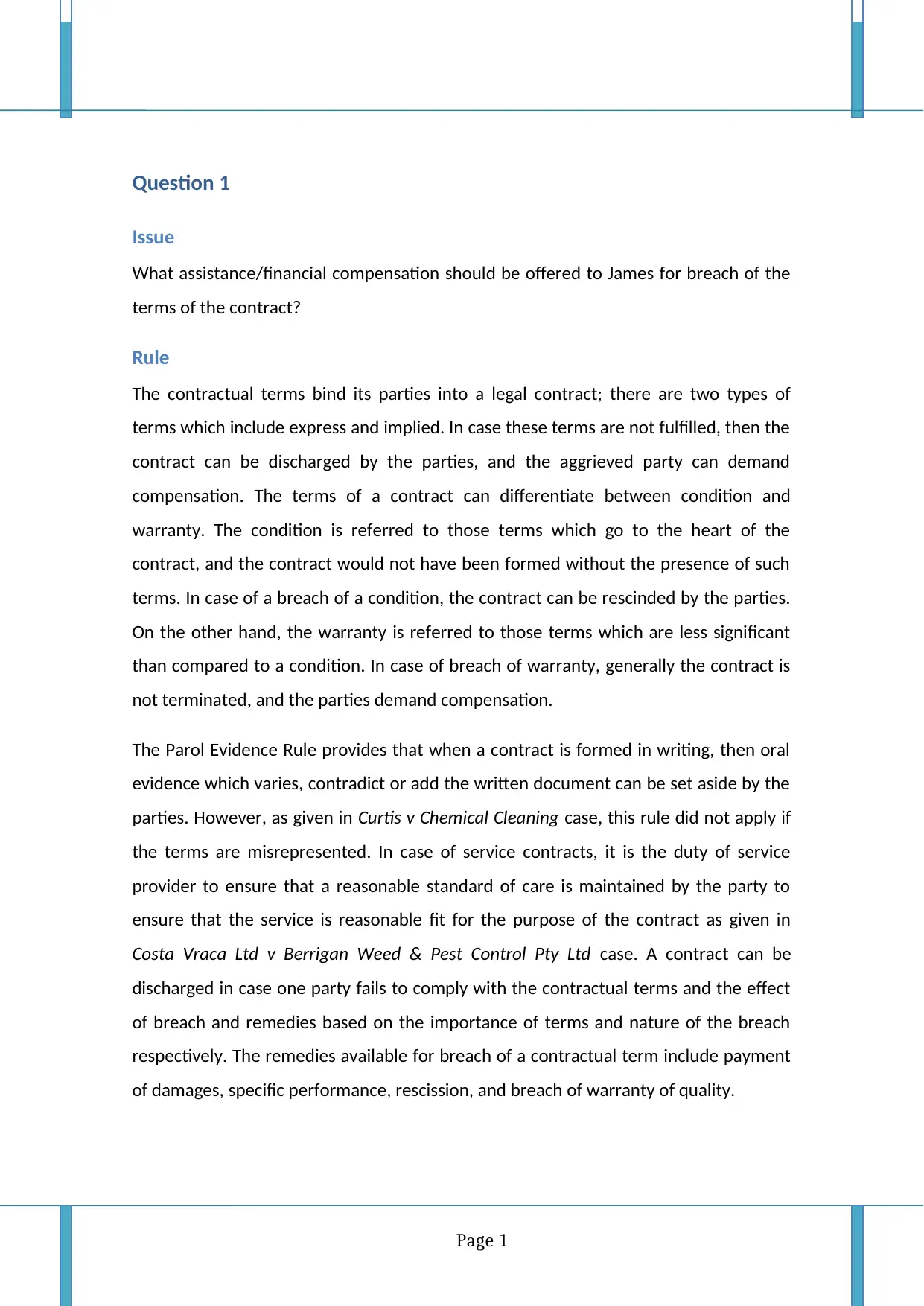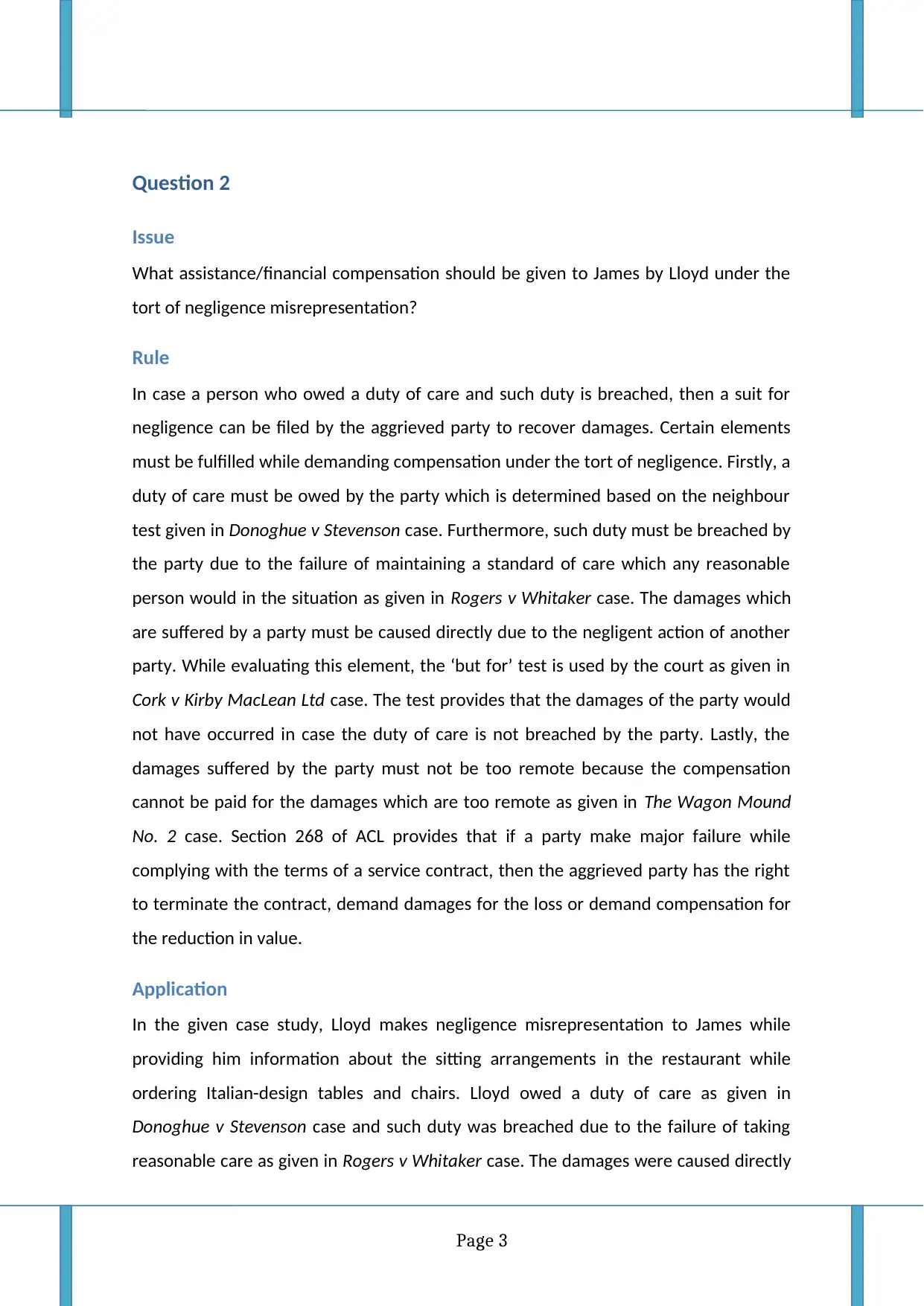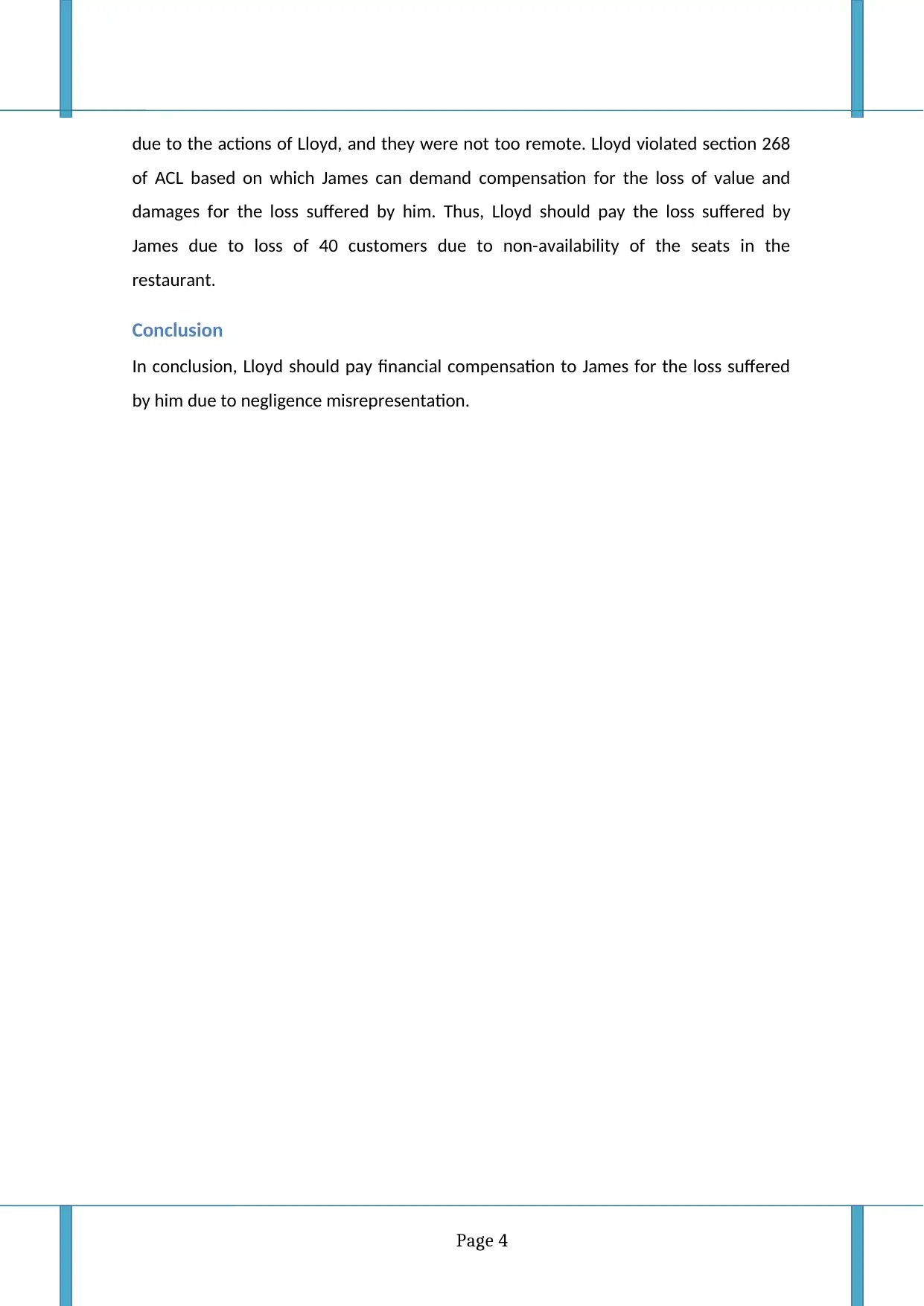LST5CCL Company Law: Remedies for Breach of Contract & Negligence
VerifiedAdded on 2023/06/07
|6
|1290
|488
Case Study
AI Summary
This assignment presents a case study involving James and Lloyd Right Pty Ltd, focusing on issues of breach of contract, negligence misrepresentation, and potential violations of the Australian Consumer Law (ACL). The first question examines the assistance and financial compensation James should receive due to Lloyd's breach of contract, particularly regarding obtaining permits and ensuring minimum seat capacity. It applies principles of contract law, including express and implied terms, the Parol Evidence Rule, and remedies for breach. The second question assesses Lloyd's liability under the tort of negligence misrepresentation, analyzing the duty of care, breach of duty, causation, and remoteness of damages, with reference to relevant case law and Section 268 of the ACL. The third question evaluates the legal risks Lloyd faces under the ACL, specifically Section 18 concerning misleading or deceptive conduct in trade or commerce. The analysis concludes that Lloyd is liable for financial compensation to James due to the identified breaches and misrepresentations.

Foundation of Company and Commercial Law
Student Name
Student ID
Tutorial day & time
Tutor’s name
Word Count: 1,158
Student Name
Student ID
Tutorial day & time
Tutor’s name
Word Count: 1,158
Paraphrase This Document
Need a fresh take? Get an instant paraphrase of this document with our AI Paraphraser

Question 1
Issue
What assistance/financial compensation should be offered to James for breach of the
terms of the contract?
Rule
The contractual terms bind its parties into a legal contract; there are two types of
terms which include express and implied. In case these terms are not fulfilled, then the
contract can be discharged by the parties, and the aggrieved party can demand
compensation. The terms of a contract can differentiate between condition and
warranty. The condition is referred to those terms which go to the heart of the
contract, and the contract would not have been formed without the presence of such
terms. In case of a breach of a condition, the contract can be rescinded by the parties.
On the other hand, the warranty is referred to those terms which are less significant
than compared to a condition. In case of breach of warranty, generally the contract is
not terminated, and the parties demand compensation.
The Parol Evidence Rule provides that when a contract is formed in writing, then oral
evidence which varies, contradict or add the written document can be set aside by the
parties. However, as given in Curtis v Chemical Cleaning case, this rule did not apply if
the terms are misrepresented. In case of service contracts, it is the duty of service
provider to ensure that a reasonable standard of care is maintained by the party to
ensure that the service is reasonable fit for the purpose of the contract as given in
Costa Vraca Ltd v Berrigan Weed & Pest Control Pty Ltd case. A contract can be
discharged in case one party fails to comply with the contractual terms and the effect
of breach and remedies based on the importance of terms and nature of the breach
respectively. The remedies available for breach of a contractual term include payment
of damages, specific performance, rescission, and breach of warranty of quality.
Page 1
Issue
What assistance/financial compensation should be offered to James for breach of the
terms of the contract?
Rule
The contractual terms bind its parties into a legal contract; there are two types of
terms which include express and implied. In case these terms are not fulfilled, then the
contract can be discharged by the parties, and the aggrieved party can demand
compensation. The terms of a contract can differentiate between condition and
warranty. The condition is referred to those terms which go to the heart of the
contract, and the contract would not have been formed without the presence of such
terms. In case of a breach of a condition, the contract can be rescinded by the parties.
On the other hand, the warranty is referred to those terms which are less significant
than compared to a condition. In case of breach of warranty, generally the contract is
not terminated, and the parties demand compensation.
The Parol Evidence Rule provides that when a contract is formed in writing, then oral
evidence which varies, contradict or add the written document can be set aside by the
parties. However, as given in Curtis v Chemical Cleaning case, this rule did not apply if
the terms are misrepresented. In case of service contracts, it is the duty of service
provider to ensure that a reasonable standard of care is maintained by the party to
ensure that the service is reasonable fit for the purpose of the contract as given in
Costa Vraca Ltd v Berrigan Weed & Pest Control Pty Ltd case. A contract can be
discharged in case one party fails to comply with the contractual terms and the effect
of breach and remedies based on the importance of terms and nature of the breach
respectively. The remedies available for breach of a contractual term include payment
of damages, specific performance, rescission, and breach of warranty of quality.
Page 1

Application
In the given case study, Lloyd Right Pty Ltd (Lloyd) has breached the terms of the
contract formed between the firm and James. All the elements of a contract were
present, thus, the parties have entered into a valid contract. One of the express terms
of the contract was that Lloyd has to obtain permits from local council. Furthermore,
the conversation between the parties regarding minimum seat capacity can be set
aside by Lloyd based on the Parol Evidence Rule. However, while purchasing the chairs
and tables, Lloyd reassured James that total 120 seats would be established in the
restaurant. Thus, Lloyd cannot rely on Parol Evidence Rule based on misrepresentation
as given in Curtis v Chemical Cleaning case. Thus, in this case, James can discharge the
contract since Lloyd failed to comply with the contractual terms by putting only 80
seats and failed to take permission from the local council. Lloyd should pay financial
compensation to James for the loss suffered by him due to removal of seats from
outside dining areas and sitting arrangement of only 80 customers. James should not
pay $15,000 to Lloyd and Lloyd should also pay for the loss of 40 customers by James.
Conclusion
In conclusion, the contract should be discharged by James and the financial
compensation includes non-payment of service charges, and James should receive
compensation for the loss of 40 customers.
Page 2
In the given case study, Lloyd Right Pty Ltd (Lloyd) has breached the terms of the
contract formed between the firm and James. All the elements of a contract were
present, thus, the parties have entered into a valid contract. One of the express terms
of the contract was that Lloyd has to obtain permits from local council. Furthermore,
the conversation between the parties regarding minimum seat capacity can be set
aside by Lloyd based on the Parol Evidence Rule. However, while purchasing the chairs
and tables, Lloyd reassured James that total 120 seats would be established in the
restaurant. Thus, Lloyd cannot rely on Parol Evidence Rule based on misrepresentation
as given in Curtis v Chemical Cleaning case. Thus, in this case, James can discharge the
contract since Lloyd failed to comply with the contractual terms by putting only 80
seats and failed to take permission from the local council. Lloyd should pay financial
compensation to James for the loss suffered by him due to removal of seats from
outside dining areas and sitting arrangement of only 80 customers. James should not
pay $15,000 to Lloyd and Lloyd should also pay for the loss of 40 customers by James.
Conclusion
In conclusion, the contract should be discharged by James and the financial
compensation includes non-payment of service charges, and James should receive
compensation for the loss of 40 customers.
Page 2
⊘ This is a preview!⊘
Do you want full access?
Subscribe today to unlock all pages.

Trusted by 1+ million students worldwide

Question 2
Issue
What assistance/financial compensation should be given to James by Lloyd under the
tort of negligence misrepresentation?
Rule
In case a person who owed a duty of care and such duty is breached, then a suit for
negligence can be filed by the aggrieved party to recover damages. Certain elements
must be fulfilled while demanding compensation under the tort of negligence. Firstly, a
duty of care must be owed by the party which is determined based on the neighbour
test given in Donoghue v Stevenson case. Furthermore, such duty must be breached by
the party due to the failure of maintaining a standard of care which any reasonable
person would in the situation as given in Rogers v Whitaker case. The damages which
are suffered by a party must be caused directly due to the negligent action of another
party. While evaluating this element, the ‘but for’ test is used by the court as given in
Cork v Kirby MacLean Ltd case. The test provides that the damages of the party would
not have occurred in case the duty of care is not breached by the party. Lastly, the
damages suffered by the party must not be too remote because the compensation
cannot be paid for the damages which are too remote as given in The Wagon Mound
No. 2 case. Section 268 of ACL provides that if a party make major failure while
complying with the terms of a service contract, then the aggrieved party has the right
to terminate the contract, demand damages for the loss or demand compensation for
the reduction in value.
Application
In the given case study, Lloyd makes negligence misrepresentation to James while
providing him information about the sitting arrangements in the restaurant while
ordering Italian-design tables and chairs. Lloyd owed a duty of care as given in
Donoghue v Stevenson case and such duty was breached due to the failure of taking
reasonable care as given in Rogers v Whitaker case. The damages were caused directly
Page 3
Issue
What assistance/financial compensation should be given to James by Lloyd under the
tort of negligence misrepresentation?
Rule
In case a person who owed a duty of care and such duty is breached, then a suit for
negligence can be filed by the aggrieved party to recover damages. Certain elements
must be fulfilled while demanding compensation under the tort of negligence. Firstly, a
duty of care must be owed by the party which is determined based on the neighbour
test given in Donoghue v Stevenson case. Furthermore, such duty must be breached by
the party due to the failure of maintaining a standard of care which any reasonable
person would in the situation as given in Rogers v Whitaker case. The damages which
are suffered by a party must be caused directly due to the negligent action of another
party. While evaluating this element, the ‘but for’ test is used by the court as given in
Cork v Kirby MacLean Ltd case. The test provides that the damages of the party would
not have occurred in case the duty of care is not breached by the party. Lastly, the
damages suffered by the party must not be too remote because the compensation
cannot be paid for the damages which are too remote as given in The Wagon Mound
No. 2 case. Section 268 of ACL provides that if a party make major failure while
complying with the terms of a service contract, then the aggrieved party has the right
to terminate the contract, demand damages for the loss or demand compensation for
the reduction in value.
Application
In the given case study, Lloyd makes negligence misrepresentation to James while
providing him information about the sitting arrangements in the restaurant while
ordering Italian-design tables and chairs. Lloyd owed a duty of care as given in
Donoghue v Stevenson case and such duty was breached due to the failure of taking
reasonable care as given in Rogers v Whitaker case. The damages were caused directly
Page 3
Paraphrase This Document
Need a fresh take? Get an instant paraphrase of this document with our AI Paraphraser

due to the actions of Lloyd, and they were not too remote. Lloyd violated section 268
of ACL based on which James can demand compensation for the loss of value and
damages for the loss suffered by him. Thus, Lloyd should pay the loss suffered by
James due to loss of 40 customers due to non-availability of the seats in the
restaurant.
Conclusion
In conclusion, Lloyd should pay financial compensation to James for the loss suffered
by him due to negligence misrepresentation.
Page 4
of ACL based on which James can demand compensation for the loss of value and
damages for the loss suffered by him. Thus, Lloyd should pay the loss suffered by
James due to loss of 40 customers due to non-availability of the seats in the
restaurant.
Conclusion
In conclusion, Lloyd should pay financial compensation to James for the loss suffered
by him due to negligence misrepresentation.
Page 4

Question 3
Issue
What legal risk Lloyd faces under the Australian Consumer Law?
Rule
Section 18 of Australian Consumer Law provides that a party can be held liable for
violating this section if a statement is made by the party regarding trade or commerce
which is misleading or deceptive or which is likely to do so.
Application
While making statements regarding the Italian-based tables and chairs, Lloyd failed to
take appropriate care which any reasonable person would in such particular situation.
By taking a reasonable standard of care, Lloyd would have avoided the loss suffered by
James. Thus, Lloyd is liable for making a misleading and deceptive statement to James
due to which he suffered loss of 40 customers. Lloyd also failed to maintain a standard
of care due to not asking the council regarding permission of outside dining. Thus,
Lloyd breached section based on which he should pay compensation to James for the
decrease in value of his restaurant’s value and the loss suffered by him of 40
customers.
Conclusion
In conclusion, Lloyd is also guilty in breaching section 18 of ACL by making misleading
and deceptive statement regarding the products.
Page 5
Issue
What legal risk Lloyd faces under the Australian Consumer Law?
Rule
Section 18 of Australian Consumer Law provides that a party can be held liable for
violating this section if a statement is made by the party regarding trade or commerce
which is misleading or deceptive or which is likely to do so.
Application
While making statements regarding the Italian-based tables and chairs, Lloyd failed to
take appropriate care which any reasonable person would in such particular situation.
By taking a reasonable standard of care, Lloyd would have avoided the loss suffered by
James. Thus, Lloyd is liable for making a misleading and deceptive statement to James
due to which he suffered loss of 40 customers. Lloyd also failed to maintain a standard
of care due to not asking the council regarding permission of outside dining. Thus,
Lloyd breached section based on which he should pay compensation to James for the
decrease in value of his restaurant’s value and the loss suffered by him of 40
customers.
Conclusion
In conclusion, Lloyd is also guilty in breaching section 18 of ACL by making misleading
and deceptive statement regarding the products.
Page 5
⊘ This is a preview!⊘
Do you want full access?
Subscribe today to unlock all pages.

Trusted by 1+ million students worldwide
1 out of 6
Related Documents
Your All-in-One AI-Powered Toolkit for Academic Success.
+13062052269
info@desklib.com
Available 24*7 on WhatsApp / Email
![[object Object]](/_next/static/media/star-bottom.7253800d.svg)
Unlock your academic potential
Copyright © 2020–2026 A2Z Services. All Rights Reserved. Developed and managed by ZUCOL.





